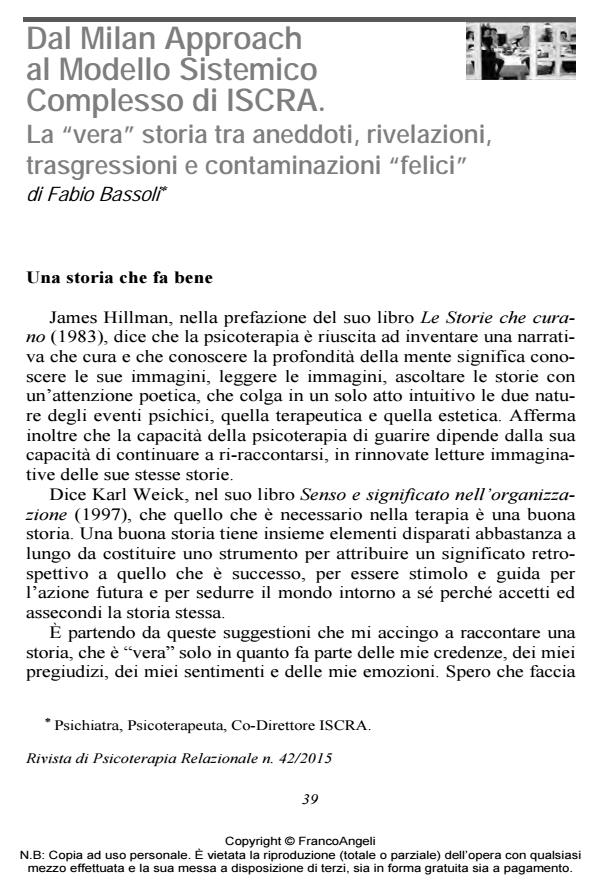From Milan Approach to ISCRA Systemic Complex Model: the "real" history among anecdotes, disclosures, transgressions and "happy" contaminations
Journal title RIVISTA DI PSICOTERAPIA RELAZIONALE
Author/s Fabio Bassoli
Publishing Year 2015 Issue 2015/42
Language Italian Pages 21 P. 39-59 File size 75 KB
DOI 10.3280/PR2015-042003
DOI is like a bar code for intellectual property: to have more infomation
click here
Below, you can see the article first page
If you want to buy this article in PDF format, you can do it, following the instructions to buy download credits

FrancoAngeli is member of Publishers International Linking Association, Inc (PILA), a not-for-profit association which run the CrossRef service enabling links to and from online scholarly content.
In this article the author will present the "real" history of the ISCRA Institute in Modena, starting from the Milan Approach which, through the training at the Milan Center for Family Therapy, and the ongoing relationships with teachers Luigi Boscolo and Gianfranco Cecchin, has stimulated its evolution, culminated in the creation, together with Mauro Mariotti, of a Systemic Complex Model, both in clinic and psychotherapy training. The author will also underline the importance of the relationship with Carlos E. Sluzki and the influence he had on the ISCRA model. The author will finally stress the strong relationship that ISCRA has over time established with the Italian Institute of Relational Psychotherapy in Rome. The "truth" of this story relates to the beliefs, prejudices, feelings and emotions of its author.
Keywords: Milan Approach, complexity, biopsychosocial.
- Bassoli F. (1988a). Prefazione. Attraverso lo Specchio, Rivista di Psicoterapia Relazionale (Psicosi e Complessità, I parte), 20: 5-6.
- Bassoli F. (1988b). Prefazione. Attraverso lo Specchio, Rivista di Psicoterapia Relazionale (Psicosi e Complessità, II parte), 21: 5-7.
- Bassoli F. (1988c). La “vera” storia del Milan Approach. Bollettino del Centro Milanese di Terapia della Famiglia, 21.
- Bassoli F., Mariotti M., Onnis L., a cura di (1994). L’adolescente e i suoi sistemi. Roma: Kappa Edizioni.
- Bassoli F., Frison R. (1998). L’arte del Corago. Un modello sistemico-relazionale per la riabilitazione psichiatrica. Milano: Franco Angeli.
- Bassoli F., a cura di (2004a). Tavola rotonda. Maieutica, 21-22: 7-8.
- Bassoli F. (2004b). Editoriale. Maieutica, 21-22: 2-3.
- Bassoli F. (2004c). I principi sistemici della psicoterapia e della mediazione. In Mariotti M., Bassoli F., Frison R., Manuale di Psicoterapia Sistemica e Relazionale. Padova: Sapere.
- Bassoli F. (2013). Intervista a Gianfranco Cecchin. Connessioni, 31.
- Bateson G. (1976). Verso un’ecologia della mente. Milano: Adelphi.
- Bateson G. (1988). Mente e Natura. Milano: Adelphi.
- Engel G. (2007). Il modello medico biopsicosociale. Torino: Edizioni Change.
- Hillman K. (1983). Le storie che curano. Milano: Raffaello Cortina. Loriedo C., Bianchi di Castelbianco A., a cura di (1990). Il bambino e i suoi sistemi. Roma: Kappa Edizioni.
- Lupoi S., De Francisci A., Angiolari C., a cura di (1985). Le prospettive relazionali nelle istituzioni e nei servizi territoriali. Milano: Masson.
- Mariotti M., Bassoli F., Frison R. (2004). Manuale di psicoterapia sistemica e relazionale. Padova: Sapere.
- Weick K. (1997). Senso e significato nell’organizzazione. Milano: Raffaello Cortina.
Fabio Bassoli, Dal Milan Approach al Modello Sistemico Complesso di ISCRA. La "vera" storia tra aneddoti, rivelazioni, trasgressioni e contaminazioni "felici" in "RIVISTA DI PSICOTERAPIA RELAZIONALE " 42/2015, pp 39-59, DOI: 10.3280/PR2015-042003